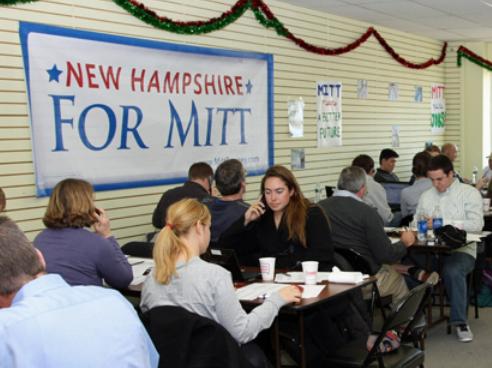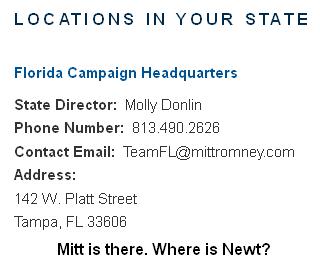
“Hi, I’m a volunteer with the Mitt Romney campaign, calling you from my computer…”
So Mitt Romney won what the Washington Post calls a “decisive victory” in Florida yesterday, and while the Republican presidential primary isn’t quite over (a majority of the votes still went to his three remaining rivals, donations keep coming in to Newt Gingrich especially), the former Massachusetts governor is now well-positioned to lock up the nomination on “Super Tuesday,” March 6, where people in eleven states cast their votes. If Romney becomes the candidate, a closer look at his current campaign can help us understand how he will fight the general election. In past cycles, most recently of course in 2008, the way candidates fought their primary gave many clues to how they ended up fighting the general election—in terms …

Gingrich needs an organization (and fast)
Newt Gingrich’s clear come-from-behind victory in the January 21 South Carolina primary has made the Republican Presidential Primary a lot more exciting than it looked after Iowa and New Hampshire. Clearly, many Republicans remain reluctant to embrace Romney. If the opposition coalesce around Gingrich, the not-Romney of the moment, the party is in for a long grind of a primary. One question right now is whether Gingrich has the organization to make the most of his momentum. Florida, January 31, is the first test. Romney has been ahead in the polls there lately, but his support is eroding and as recently as December, Gingrich had a solid lead. The political climate in the sunshine state can be fickle and is …

Sticking it to the man with the tool at hand
The Guardian and the LSE have partnered up on an impressive journalistic-cum-sociological analysis called “reading the riots”, examining the unrest that rocked England this summer on the basis of interviews with people involved, massive social media datasets, and various forms of secondary sources. This is a very laudable attempt to make sense of what happened why in August, important questions at the heart of both journalism and social science. The collaboration examines many different themes, today the role of different “social media” (and more generally, digital networked media) in the riots. The material released provides both qualitative and quantitative evidence for dismissing the claims—frequent in August, and spread by for example by an Associated Press story still up on thousands …

Supporting the past, ignoring the future? Public sector support for the media
Though Western media systems are going through a rapid and often painful transformation today with the rise of the internet and mobile platforms, the decline of paid print newspaper circulation, and the erosion of the largest free-to-air broadcast audiences, the ways in which governments provide direct and indirect support for the media have remained largely unchanged for decades. The bulk of the often quite considerable direct and indirect subsidies provided continue to go to industry incumbents coming out of broadcast and print, while innovative efforts and new entrants primarily based on new media receive little or no support. In central ways, public support for the media remains stuck in the twentieth century, and some parts of these support systems are …
The Business of Digital Journalism and Why it Matters for Democracy
Many commercial legacy media organizations around the Western world are having a hard time these days, still hit by the impact of the recession on their revenues, and struggling with the different structural adjustments they will have to make as they move from the relatively stable and platform-specific media markets of the mid-twentieth century to the increasingly convergent and overlapping media environment of the 21st century. Newspapers in particular, from national flagship titles over regional powerhouses to local weeklies, are often in trouble. Changes in the business of journalism have potentially profound consequences for our democracies, because private media like newspapers have employed many of the journalists who inform us all (and occasionally misinforms us) about what goes on in …
Mundane internet tools and political mobilization
For some time, I’ve been developing the argument that when we want to understand the role of internet technologies in politics—in particular when it comes to getting people involved in electoral campaigns, in various forms of activism, and in other forms of civic and political activity—we should focus less on the newest and most heavily hyped tool of the moment (Twitter election! Twitter revolution!) and pay more attention to the role of what I call “mundane internet tools” like email, search, and ordinary websites. New Media & Society has published the article where I make the argument, based on ethnographic research I did during the 2008 U.S. elections, but based on intuitions and interests aroused by previous research in the …
Did the fax machine cause the Tunisian uprising?
Sounds unlikely. Did Twitter? Nobody really seems to claim so, though Evgeny Morozov erroneously claims that Andrew Sullivan claims so, though Sullivan actually only raised the question and linked to Ethan Zuckerman, who … wait, back to the fax machine. I met Marc Plattner yesterday, who edits the Journal of Democracy and is a veteran of both academic and policy discussions around issues of democracy and democratization. He told me about how some people used to claim the fax machine “caused” (or at least played a large part in) the collapse of the Soviet Union. You can imagine all the arguments that could be marshalled. (“Between them, television, the fax machine and word of mouth have banished fear,” writes John …










